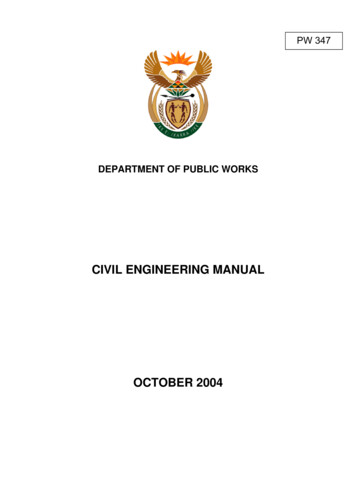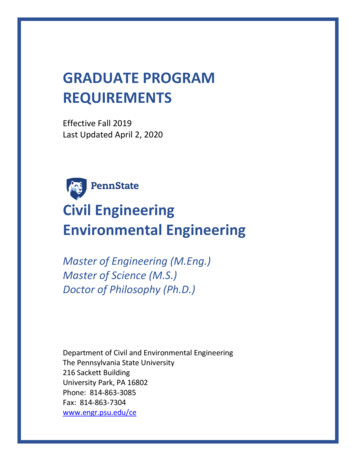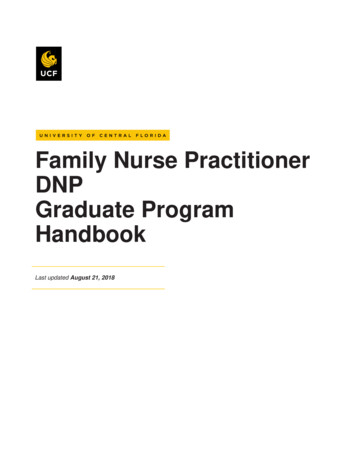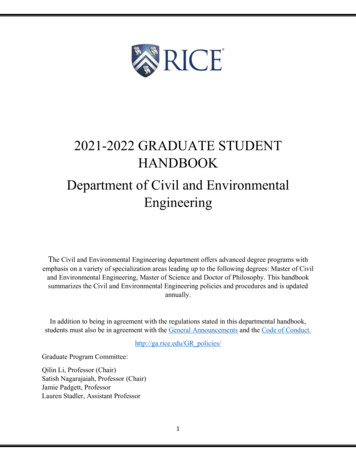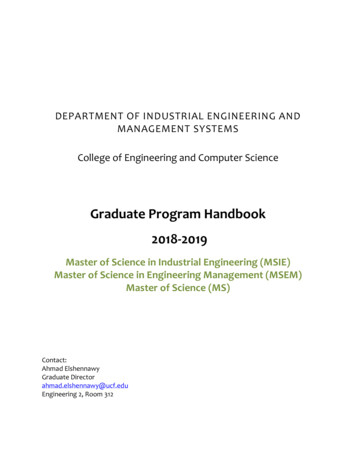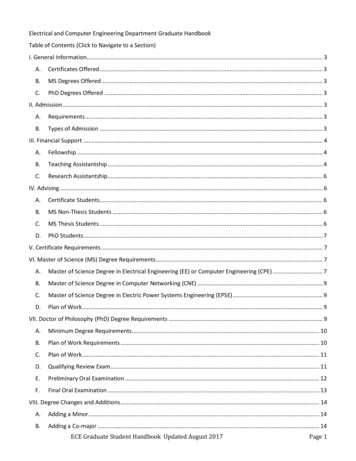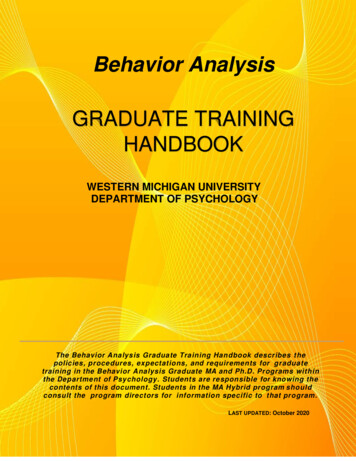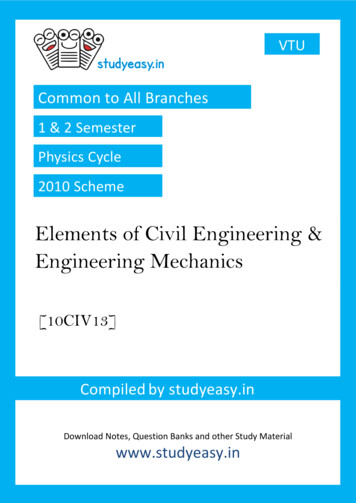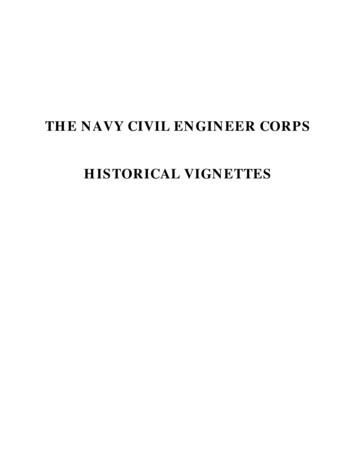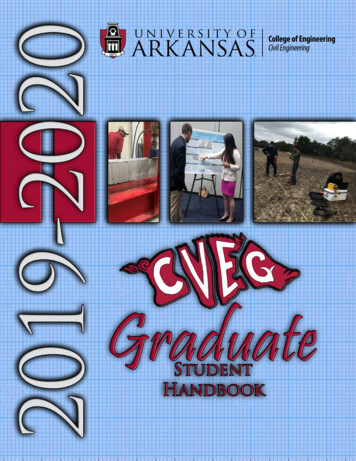
Transcription
Civil Engineering Graduate Student Handbook 2019-2020 1
Civil Engineering Graduate Student Handbook 2019-2020TABLE OF CONTENTS (REVISED 1-2017)Why This Handbook? . 1Program Overview . 1Message from the Department Head . 2Meet the Faculty. 3Requirements to Enroll in a Graduate Program . 4Undergraduate DegreeRequirements Transfer of Creditfrom other UniversitiesFinancial Assistance: Scholarships & Assistantships . 4Duration of Financial AssistanceNumber of Credit Hours, Research Hours, and Coursework RequirementsObligations of Those Receiving Financial AssistanceProgram Descriptions . 6General RequirementsMaster of Science in CivilEngineering Doctor of Philosophy(Ph.D.)Planning a Graduate Program . 8Planning a Research ComponentSelection of a Major ProfessorSelection of a Program StudyCommittee Suggested TimelineProgram Proposal . 11Conduct of Research . 12Program Examinations . 13Publishing the Research . 14 0
Civil Engineering Graduate Student Handbook 2019-2020WHY THIS HANDBOOK?This handbook supplements the Graduate School Catalog and other materials provided by theGraduate School and the College of Engineering. The purpose of the Civil Engineering (CVEG)Graduate Student Handbook is to: Help prospective students understand what is involved in a graduate program; Provide information about the Civil Engineering Graduate Programs, course requirements, andprocedural matters.As a core of its mission, the University of Arkansas provides students with the opportunity tofurther their educational goals through programs of study and research in an environment thatpromotes freedom of inquiry and academic responsibility. Accomplishing this mission is onlypossible when intellectual honesty and individual integrity prevail.Each student is required to be familiar with and abide by the University’s Academic IntegrityPolicy , which may be found at http://provost.uark.edu/academicintegrity. Students withquestions about how these policies apply to a particular course or assignment shouldimmediately contact their instructor.PROGRAM OVERVIEWThe CVEG Department offers three Masters of Science graduate programs: Master of Science in Civil Engineering (MSCE); this is a thesis-based degree that requirescompletion of 24 credit-hours of coursework and 6 credit-hours of thesis research Master of Science in Environmental Engineering (MSEnE); this is a thesis-based degree thatrequires completion of 24 credit-hours of coursework and 6 credit-hours of thesis research Master of Science in Civil Engineering (MSCE Coursework Only); this is a coursework-onlydegree that requires completion of 30 credit-hours of courseworkIn addition, a coursework-only Master of Science in Engineering (MSE) degree is administeredthrough the College of Engineering. This degree is offered only to students pursuing the degreethrough distance education and is not detailed further in this document.The CVEG MS programs are designed to: Broaden a student’s knowledge of the principles and practices of Civil and/or EnvironmentalEngineering; Allow a student to develop a level of specialization in one aspect of engineering practice; Expose a student to testing, design, and analytical procedures through hands-on research activities; Improve a student’s report writing and oral presentation skillsThe CVEG Department also offers a Doctoral (Ph.D.) degree. Ph.D. students are expected to becapable of independent scholarly study and to possess the ability to further engineering practicethrough research and other creative pursuits. 1
Civil Engineering Graduate Student Handbook 2019-2020The PhD program is designed to: Explore new frontiers in Civil Engineering; Organize and conduct an intensive research study in a specific problem area; Compile and organize data and its analysis in a form suitable for publication in peer-reviewedliteratureThe MSCE and the Ph.D. programs that we offer emphasize one of the following areas: Environmental EngineeringGeotechnical Engineering Structural EngineeringTransportation EngineeringMESSAGE FROM THE DEPARTMENT HEADWelcome to the University of Arkansas graduate program in Civil Engineering. An advanceddegree is becoming increasingly important to the practice of engineering and should be veryvaluable to you in your career. We are devoted to providing a solid academic experience so thatyour degree will be of maximum benefit to you and are committed to putting you in a position tosucceed.We ask that you read this Handbook carefully. It will serve as your guide to navigate the variouspolicies and procedures of the Department, the College, and the University. It also will provideyou with valuable information for planning, executing, and completing your graduate program.In many cases, this Handbook will reference College of Engineering and/or Graduate Schoolpolicies. I urge you to locate and read all applicable policies, so that your primary focus will beproperly placed on your studies and research activities, rather than with administrative logistics.Ultimately, your experience in Graduate School will be largely determined by your own driveand passion. We are excited and honored to help you discover and nurture that passion. Theglobal society needs engineers to address and solve significant issues facing people each day.Your graduate degree will enable you to step into a leadership role as that problem solver.We look forward to working with you throughout your degree program. We are here to help! Ifany of the faculty or staff can be of assistance, please do not hesitate to ask.W. Micah Hale, Ph.D., P.E.Professor and Department Head21st Leadership Chair in CivilEngineering 4190 BellEngineering Center Fayetteville,AR 72701T: 479.575.6348E: micah@uark.edu 2
Civil Engineering Graduate Student Handbook 2019-2020MEET THE FACULTYEnvironmentalGeotechnicalStructuralCameron MurrayTransportation 3
Civil Engineering Graduate Student Handbook 2019-2020REQUIREMENTS TO ENROLL IN A GRADUATE PROGRAMTo be considered for regular admission to graduate standing, applicants must comply with all generalrequirements of the Graduate School. In addition, applicants must meet the following specificrequirements to be accepted for graduate study in the Department of Civil Engineering, which include: Grades in University classes, including an undergraduate degree in Civil Engineering or closelyrelated discipline with a cumulative GPA above 3.0 (on a 4.0 scale);GRE (Graduate Record Examination) scores of 302 (verbal quantitative) and 3.5 (analyticalwriting);Foreign applicants without a degree from a U.S. institution or a native English-speakingcountry must have a TOEFL (Test of English as a Foreign Language) score of 79 or equivalent;Statement of purpose including the applicants intended area of specialization.Undergraduate Degree RequirementsApplicants possessing an ABET-accredited undergraduate engineering degree, and applicants with anundergraduate engineering degree from a foreign university are eligible for admission into the graduateprogram.Applicants who do not have an undergraduate engineering degree from an ABET-accredited institutionare eligible for admission into the graduate program, provided a CVEG faculty member, who is willingand able to be their major adviser, determines their academic background is suitable for study at theM.S. or Ph.D. level.Transfer of Credit from Other UniversitiesA M.S. or a Ph.D. student may apply to receive transfer credit for one or more classes (up to 6 credithours) from another recognized graduate school in the United States, provided the class grade was B orbetter, all U of A residency requirements have been met, and the student's Graduate Program of StudyCommittee approves. Graduate courses taken at Graduate Residence Centers of the University ofArkansas System may be transferred to a M.S. or a Ph.D. program. Courses taken through GraduateResidence Centers may not be used to satisfy residency requirements for the Ph.D. degree inEngineering.FINANCIAL ASSISTANCE: SCHOLARSHIPS AND ASSISTANTSHIPSFinancial assistance is available on a competitive basis to qualified students working in M.S. and Ph.D.degree programs.A scholarship is awarded to help a student pay for costs associated with obtaining a degree and mayhave certain stipulations attached. In an assistantship, a student is paid to perform specific work andtypically includes a monthly stipend and payment of tuition. An assistantship can take the form of ateaching assistant (TA) or research (RA) assistant position. Typically, students working on researchprojects will be employed as a RA. Alternatively, TA’s are available to those students assisting faculty inclassroom or laboratory activities. 4
Civil Engineering Graduate Student Handbook 2019-2020Requests for financial assistance should be made at the time of application to the program. Requests forre-appointment must be initiated by the student's major professor and should be accompanied by awork and study plan showing the proposed schedule needed to complete the degree requirements,including thesis or dissertation and final oral exam.Duration of Financial AssistanceA graduate student assistantship must be renewed each semester. The maximum duration of graduateassistantship employment is generally limited to two years for M.S. candidates and three years beyondthe M.S. degree for Ph.D. candidates. Special circumstances may warrant additional extensions, withthe approval of the student's major professor and the Department Head.An assistantship or other financial support may be terminated for failure to maintain acceptableacademic standards (GPA 3.00 and a grade of C or better in all graduate courses), failure to satisfactorilyperform assigned duties, or failure to otherwise make satisfactory progress toward the degree. If theagency funding the research or assistantship terminates the project and the funding, then theassistantship will also terminate. However, this is extremely rare.Number of Credit Hours, Research Hours, and Coursework RequirementsTo be appointed to an assistantship, a student is required to complete a certain number of credit hoursfor that semester – 6 in the fall, 6 in the spring, and 3 in the summer. A maximum of 9 credit hours ispermitted for the fall and spring semesters and 6 for the summer.Most graduate students have a 50% appointment, which requires 20 hours of research per week. Thisappointment pays tuition and monthly stipend, but not fees. Alternatively, students may also have a25% appointment, which requires 10 hours of research per week but does not cover tuition or fees.Ph.D. students who have completed their course work and are not appointed must register for at leastone credit hour of research (dissertation) each semester until the degree is completed to maintainstudent status.MSCE Coursework Only students must complete 30 hours of coursework at the 4000- and 5000-level. Amaximum of 6 credit hours may be at the 4000-level, provided they were not presented for anotherdegree (e.g., BS degree).MSCE students (thesis option) must complete 24 hours of course work at the 4000- and 5000-level. Amaximum of 6 credit hours may be at the 4000-level, provided they were not presented for anotherdegree (e.g., BS degree).Doctoral students must complete 36 hours of course work at the 5000-level; however, up to 6 credithours may be at the 4000-level, provided they were not presented for another degree (e.g., BS degree).As such, a student obtaining a MS from the CVEG program needs to complete an additional 12 hours ofcoursework to satisfy this requirement for a PhD.Obligations of Those Receiving Financial AssistanceSubmission of Thesis or DissertationThe policy of the department is that any degree candidate who has been employed as a graduateassistant is expected to conduct research having a significant creative component and to prepare anddefend a thesis or dissertation. For international students, the department will not sign any U.S. 5
Civil Engineering Graduate Student Handbook 2019-2020Citizenship and Immigration Services F-1 Optional Practical Training (OPT) forms until the graduatestudent has submitted a complete thesis or dissertation to the Graduate School.Outside EmploymentFor students employed as a RA or TA, other employment is not permitted unless written permission isobtained from the major adviser and Department Head. However, permission is rarely given for astudent employed as a RA or TA. Other University policies regarding employment may also apply.Work ScheduleRAs and TAs are employees of the CVEG Department and are expected to adhere to the University'sfaculty and staff work calendar. Time off is normally allowed only on scheduled University holidays. Theweeks between semesters and Spring Break week are not holidays, and employees are expected to workduring those times. A student’s major advisor may approve exceptions.Employee ConductA graduate assistant should also recognize that, as an employee of the Department, he or sherepresents the Department to the public when working on a research project. Therefore, each personshould strive to present himself/herself in a professional manner – including actions, words, andappearance/proper dress.PROGRAM DESCRIPTIONSGeneral RequirementsBoth the MSCE and the PhD programs include classroom and research components. For the classroomcomponent, students must complete a specified number of advanced classes. For the researchcomponent, students must conduct research and write a thesis/dissertation that describes the researchand its contribution to the field of study.Master of Science in Civil Engineering (MSCE)The following chart lists options for the MSCE (thesis track) and MSCE Coursework Only degrees.ComponentMSCEMSCE Coursework OnlyCoursework24 hours30 hoursMaster’s Thesis6 hours0 hoursTotal30 hours30 hours*The number of hours listed are minimums*Limit of 6 hours of CVEG 4000 classesFor the MSCE (thesis track) degree, in lieu of a traditional thesis, submission of at least one manuscriptfor publication in a peer-reviewed journal may be substituted, as determined in consultation with thestudents’ major advisor and thesis committee. The student must be first author on at least onemanuscript submittal.For the MSCE (coursework only), a graduate portfolio is required. The Graduate Portfolio providesevidence of attainment of the Student Learning Outcomes (SLO) for the graduate programs in the 6
Civil Engineering Graduate Student Handbook 2019-2020Department of Civil Engineering. It is the responsibility of the graduate candidate to select and archivehis/her graded work which demonstrates SLO attainment. The candidate’s graduate academic adviserwill coordinate a review of the Portfolio and the preparation of an Assessment of Abilities (AA) formprior to the granting of a graduate degree.The student should archive graded work – including exams, homework assignments, projects, papers,etc. – which demonstrates achievement of the graduate Student Learning Outcomes:1. Apply knowledge of mathematics, science, and engineering to solve advanced-level problems incivil engineering.2. Locate and evaluate pertinent published literature relevant to a given topic, and apply theinformation gained to a design, analysis, or research effort.3. Organize and deliver effective communications.4. Design a system, component, or process to meet desired needs.5. Design and conduct experiments and analyze and evaluate the resulting data.Students are encouraged to maintain a binder (or other suitable format) subdivided by SLO, in whichgraded work is archived. It is preferable to include a minimum of 2 work items per SLO in the portfolio,if possible, drawn from a cross-section of the student’s educational activities and courses. Portfoliosmay be maintained and submitted electronically, using scanned copies of graded work; however, suchelectronic portfolios should be well organized, and provide a reviewer clear indication of which workpertains to specific learning outcomes.In all cases, students are strongly encouraged to work closely with the academic adviser to ensure thePortfolio reflects the students’ abilities and accomplishments throughout their graduate programs. It isadvisable to not postpone preparing the Portfolio, but instead to consider it as a work in progressthroughout the student’s graduate program.Doctor of Philosophy (Ph.D.)Doctor of Philosophy programs consist of in-depth study through advanced courses in civil engineering andsupported disciplines, plus an intensive research investigation leading to the preparation of a dissertation.In lieu of a traditional dissertation, submission of at least three manuscripts for publication in peerreviewed journals may be substituted, as determined in consultation with the students’ major advisor anddissertation committee. The student must be first author on at least three journal submissions and at leastone article must be accepted for publication prior to graduation.Candidates for the Ph.D. degree must either satisfy a language requirement by demonstrating a readingknowledge of a foreign language that has been recommended by his/her Doctoral Advisory Committee, orcomplete 6 semester credit hours of course work in a field consistent with the student’s program of study(outside the Department of Civil Engineering) and career goals.The following chart lists some program details for the PhD degree. Coursework and research creditrequirements depend on the student’s highest degree at the time of application to the Ph.D. program. 7
Civil Engineering Graduate Student Handbook 2019-2020Previous highest degreeDoctor of Philosophy in Engineering (Ph.D.)Requirements72 credit hours, including Doctoral Dissertation and coursework creditsB.S.A minimum of 36 credit hours of courseworkThe difference in credit hours in Doctoral Dissertation42 credit hours, including Doctoral Dissertation and coursework creditsM.S.A minimum of 12 credit hours of courseworkThe difference in credit hours in Doctoral Dissertation*Limit of 6 hours of CVEG 4000 level classes total can be applied to a Ph.D.PLANNING A GRADUATE PROGRAMThe student is responsible for initiating actions required for fulfilling the requirements for the degree.This includes ensuring all deadlines for activities are met and submission of the properly completedforms. The student is responsible for keeping his or her major professor informed of the progress onassignments, for initiating and conducting a research project with the assistance and cooperation of themajor professor, and for scheduling committee meetings and candidacy exams.Planning a Research ComponentA thesis or dissertation is based on research a student performs under the supervision of an advisingprofessor. The student is responsible, with the assistance of the advisor and Program of StudyCommittee, for planning and designing a research project serving as a basis for his or her thesis ordissertation. It is most common for the thesis/dissertation to be based on work a student performswhile employed as a RA. Often, the same work that a student does for his/her research is the basis forthe thesis/dissertation as well as reports to funding agencies that sponsored the research and technicaljournals for publication.Preparation of the thesis or dissertation is the responsibility of the student and its completion includes aprofessional obligation to the major professor and to the department. Completion of the thesis ordissertation within a reasonable time period requires careful planning and timely execution of theunderlying research project. It is the responsibility of the student to coordinate with his or her majorprofessor or Program of Study Committee for advice on how to complete the thesis or dissertation. Ifdifferences occur between the student and the major professor or Program of Study Committee thatseemingly cannot be resolved, the Department Head should be contacted for resolution of differences.While initiation of actions is the student's responsibility, the major professor and Program of StudyCommittee are responsible for assessing the quality and completeness of the degree program and may 8
Civil Engineering Graduate Student Handbook 2019-2020provide suggestions or requirements to satisfy the minimums stated in the Graduate Catalog or thisGraduate Student Guide.Selection of a Major ProfessorA member of the graduate faculty within the CVEG department will serve as a major professor fordirecting a student's program of study. This association is based largely on the common interests of thestudent and the faculty member and typically is arranged at the time of admission to the program. Thestudent's personal preference for a specific major professor will be honored to the extent possible,although some adjustment may be required to accommodate faculty loads and financial resources. Themajor professor is the student's academic adviser as well as supervisor of a research program thatincludes preparation of a thesis or dissertation. Generally, the principal investigator of research projectson which the student is supported will be the student's major professor. The major professor will assistthe student in nominating a Program of Study Committee, will periodically review the progress of thestudent's research program, and will assist the student with preparation of the thesis or dissertationbefore it is submitted to the Program of Study Committee.Selection of a Program of Study CommitteeA graduate student working toward a degree should select a Program of Study Committee prior to thesecond semester after joining the program. The student's major professor will serve as chairperson ofthis committee. Committee members are selected from department or university faculty who’seducational and research interests are best suited to guide the student and evaluate the progress of hisor her graduate study. The Department Head is an ex-officio member of all Program of StudyCommittees. The following describes the requirements for committee membership: M.S. committee must consist of a minimum of three members selected from the graduatefaculty, at least two of which must be from the CVEG departmentPh.D. committees must consist of a minimum of four members selected from the graduatefaculty, one of which must be from outside the CVEG departmentThe Program of Study Committee should meet periodically to review the student's progress and toprovide input and direction to the program. As a minimum, formal meetings should be held to approvethe program of study, at the preliminary exam for Ph.D. candidates, and at the final oral exam or thesisor dissertation defense.Suggested TimelineThe chart which follows shows a typical MSCE timeline and the various tasks required. 9
Civil Engineering Graduate Student Handbook 2019-2020Civil Engineering Graduate Student Handbook 2019-2020Master's Program e youcontinuinginPer Major AdvisorMeet withMS Recordof ProgressResearchLibrarianMaster'sDefenseDRAFT ThesisOral PresentationAre YouOn anAppointment?Assistants hipAgree &3 weeks:minimumoi ·e,Month"''0I,' .o123456108 971112LFall 1Spring 113 14 15 16 17 18 19 20 21 22 23 24LJ ----Sum 1Spring 2Fall 2JSum 2The chart which follows shows a typical PhD timeline for Years 1 and 2 and the various tasks required.Doctoral Program Timeline (Years 1&2)Doctoral (Work with AdviserProposal on exact timing)DRAFT ProposalOral PresentationProposed Program of StudyDoctoralCandidacy ExamAre YouContinuingIn theProgram?Are YouContinuingIn theProgram?Are You on anAppointment?Month --- --- - --- ---1- -- -- -- - -- ---'- -- --- - --- ---1- --- - - ---- --- - 123456789101112l J.13 14 15 16 17 18 19 20 21 22 23 24,l J 10
Civil Engineering Graduate Student Handbook 2019-2020The chart which follows shows a typical PhD timeline for Years 3 and 4 and the various tasks required.PROGRAM PROPOSALAll Ph.D. students must prepare and submit a Program Proposal. M.S. students (thesis track only) areencouraged to submit a Program Proposal although it is not required. A Ph.D. Program Proposal mustbe completed a minimum of 1 year prior to the student’s Ph.D. defense.For both M.S. and Ph.D. students, each student must attend an orientation session, workshop, orpersonal appointment with the Engineering Research Librarian regarding library services and proceduresprior to submitting the Program Proposal. The student must submit written documentation certifyingparticipation in such activity. The following lists show the major elements that should be included in theProgram Proposal.Program Proposal Content for M.S. Students (thesis track only) A list of the Graduate Program Committee members. A literature review of the research area A discussion of the research topic for the Masters Thesis; the content and extent/scope of thisdiscussion is determined in consultation with the student’s thesis adviser. A list of support items necessary for completing the proposed research, i.e., laboratory space,specific equipment requirements, computing requirements, projected expendable supplies,projected travel requirements, etc. A list of the coursework to be completed for the degree sought. A proposed schedule/timeline for completing the research, including a date for delivering acomplete draft of the Masters thesis. The proposed schedule should identify specificmilestones to be accomplished during the research and thesis preparation effort. 11
Civil Engineering Graduate Student Handbook 2019-2020 All required forms related to the M.S. Program must be submitted to the graduate school withinthree working days after successfully completing the Masters Program Proposal. It is thestudent’s responsibility to:o correctly complete all forms and submit them to the appropriate person(s); ando submit copies of these forms to the Department of Civil Engineering, to be placed in thestudent’s academic file.Program Proposal Content for Ph.D. Students A list of the Doctoral Program Committee members. A literature review of the research area A discussion of the research topic for the Doctoral Dissertation; the content and extent/scope ofthis discussion is determined in consultation with the student’s dissertation adviser. It isexpected, however that the discussion will demonstrate a high degree of understanding of thescope and objectives of the proposed research and will contain a significant review of pertinentliterature related to the topic. A list of support items necessary for completing the proposed research, i.e., laboratory space,specific equipment requirements, computing requirements not commonly available, projectedexpendable supplies, projected travel requirements, etc. A list of the coursework to be presented for the degree, including both previously completed andproposed courses. A proposed schedule/timeline for completing the research, including a date for delivering acomplete draft of the dissertation. The proposed schedule should identify specific milestones tobe accomplished during the research and dissertation preparation effort. All required forms related to the Doctoral Program must be submitted to the Graduate Schoolwithin three working days after successfully completing the Doctoral Program Proposal. It is thestudent’s responsibility to:o correctly complete all forms and submit them to the appropriate person(s);o submit copies of these forms to the Department of Civil Engineering, to be placed in thestudent’s academic file.CONDUCT OF RESEARCHTasks required for the completion of the research portion of the graduate program should be conductedin a professional manner. This includes timeliness, thoroughness, and with utmost integrity. Workspacesshould be kept orderly. All applicable safety rules and policies must be followed stringently; safetyequipment and supplies must be kept well-stocked and used as appropriate. Project deliverables– items such as laboratory/field data, reports, photo/video recordings, etc. – should be submitted asrequired, in a timely fashion. In addition, backup copies of deliverables should be kept up to date toreduce the risk of ‘losing’ valuable project data.Graduate students may be required to conduct research activities in the laboratory and/or in the field.At all times, graduate students should remember that they represent the University of Arkansas and theDepartment of Civil Engineering while conducting University-related business. As such, each person 12
Civil Engineering Graduate Student Handbook 2019-2020should strive to present himself/herself in a professional manner – in speech, actions, and appearance.Depending on the type of work being performed, additional clothing items and/or accessories
This handbook supplements the Graduate School Catalog and other materials provided by the Graduate School and the College of Engineering. The purpose of the Civil Engineering (CVEG) Graduate Student Handbook is to: Help prospective students understand what is involved in a graduate program;

